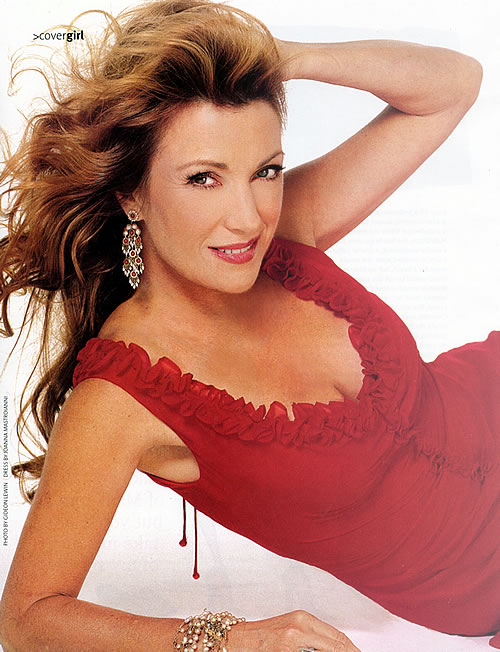
My story is a very long story
and I could write a very long book about it. I started out
in the chorus of a film,
Oh! What a Lovely War,
when I was 16 or 17 years old. It was the first film by
Richard
Attenborough and I was singled out, unbeknownst to me,
to have a medium close-up, and the top agent in England saw
me on film and said this girl is going to become a big star.
T.G. : You
seem to have incredible discipline. Did you learn this in
the ballet?
J.S.: Absolutely. There is no
discipline like ballet. In the ballet you can't stop for
a single day. If they give you two weeks off, you still have
to do bar, stretch, strengthening and practice. In class,
the discipline was such that, unless you were 10 minutes
early for the class, you weren't even allowed in. . I learned
how to do my own hair and make-up while I was in the ballet.
I learned how to sew my own ballet shoes and how to embroider
my own toe shoes, I even learned how to knit the warm-up
gear. . I realized that if I could knit and sew my necessary
ballet things, then I could knit and sew attractive things,
not just useful things, so I started my own company when
I was 17. I had been crocheting, knitting and embroidering
and I showed my pieces to a shop in London. They went crazy
for them and began ordering from me.
T.G.: It seems as though you
have always worked.
J.S.: Yes I have.
My father was a doctor, but any money that he had was spent
on my education. While I was dancing, I needed to buy point
shoes, because I went through about three pairs a week. They
were very expensive because they had to be handmade. I always
worked so I could purchase what I needed.
T.G.: Tell
me about your mother.
J.S.: . My
mother is 90 and she is absolutely incredible. She was born
in Holland and she was known as being one of the most beautiful
women in the country. Her name is Mieke Frankenberg. My mother
had many tragedies in her life and at the age of 20, she
married her first boyfriend and moved to Indonesia, where
her husband worked on a tea plantation. She had a very abusive
first marriage. She escaped from her husband but war broke
out and she was incarcerated in a concentration camp for
three years. She met my father years later. My father was
the chief of police.
My mother was
quite amazing. She was a member of the Red Cross and while she
was in the camp she took it upon herself to look after the sick
prisoners. She has always told me that if you have problems in
your life, if you go out and do something for someone else and
don't ask for anything in return, your problems will diminish.
You take yourself out of the "me" syndrome and into
the "what can I do for someone else less fortunate?" mindset.
This is, of course, one of the most important lessons in life.